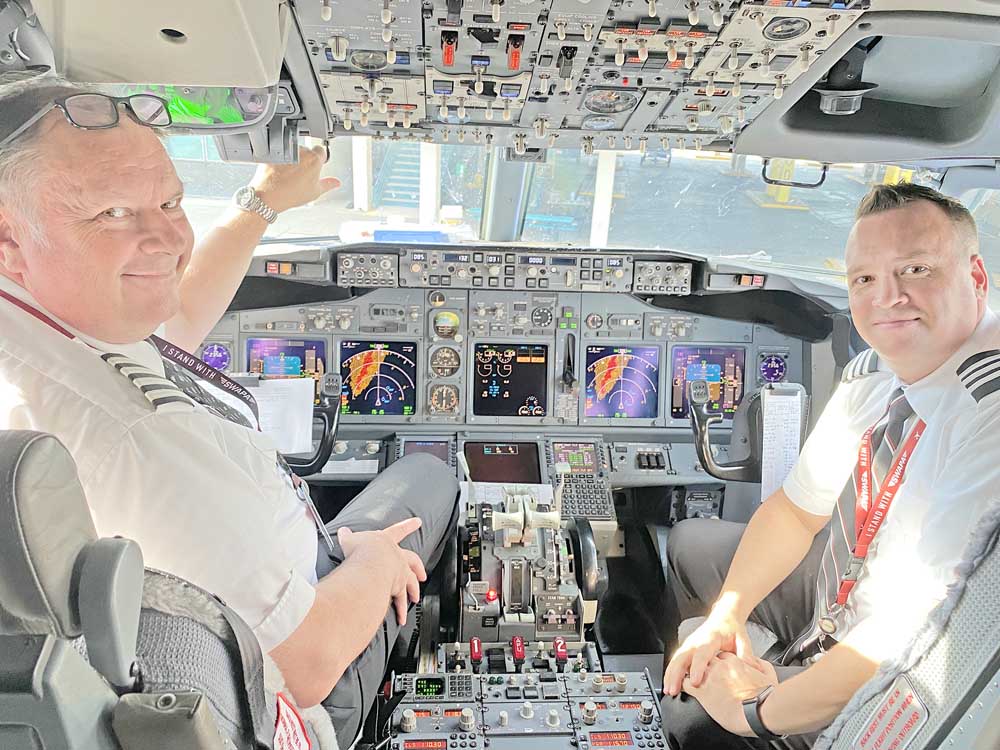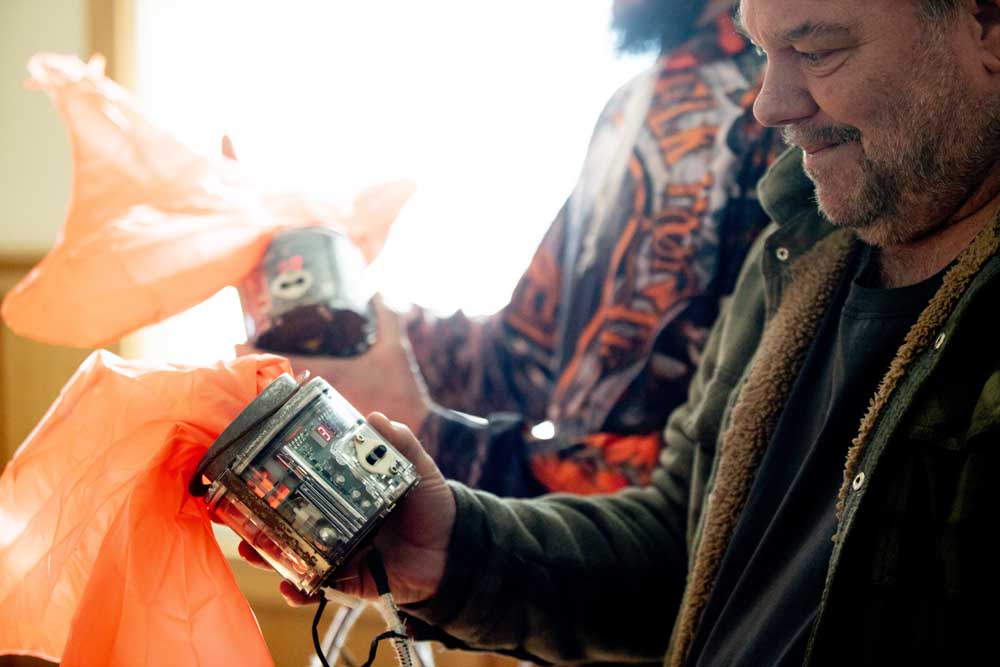Coast Chronicles: Fear of Flying
Published 12:08 pm Monday, September 11, 2023

- Pilots Brad, left, and Justin safely flew folks to El Paso, Texas.
In 1973 in the second half of my first year away from home at college, I read Erica Jong’s then recently published “Fear of Flying.” Though probably now relegated to the dust bin of history for most folks, at the time it rocked the world of writers, women, feminists, and undoubtedly a few men too. I loved its irreverence, humor, wit and power; and it’s honest assessment — from a woman’s point of view — of all things sexual.
Trending
As Fay Weldon comments in the introduction to the 40th anniversary edition, at that critical juncture in time, “Women trembled between the old world and the new. Women had won their sexual freedom, thanks to the Pill, but men still ruled the roost and women still wanted to please them.” John Updike called Jong’s book the female answer to “Portnoy’s Complaint” or “The Catcher in the Rye” — it’s basically about a woman trying to fly free of her repressions, to find her true passions, dreams, and live out her erotic fantasies.
I’m not going to be able to dive into any of that in our humble but award-winning family news weekly, but I am going to use Jong’s great title; and I am actually writing about flying this week, something I recently did again for the first time since covid arrived.
Flying is humbling and magnificent
Maybe everyone is a little afraid of flying. I remember descending into Oakland on one rather rocky Alaska Air flight when the gentleman sitting next to me grabbed my hand and sort of whimpered all the way down. We landed safely. But flying does make one a bit nervy — voluntarily entering a metal tube, strapping in with total strangers, and knowing full well that your life is in the hands of others (generally and, yes, still mostly men) is scary.
On the last leg of my flight this time, my two friendly pilots — Brad and Justin — seemed competent. They opened the cockpit door and confidently began flipping switches and toggling lights and so forth; I overheard one of them tell the stewardesses (yes, all women), “We might have a little turbulence going into El Paso, but nothing too bad.” (Not to worry little ladies.) OK, I’ll put up with some post-#Metoo-machismo if you get me on the ground in one piece.
Then the take-off and that wonderful exhilaration you feel when the wheels, rumbling along the runway at an alarming speed, leave the earth. If you can put your mind at rest and just look out the window as you begin to rise, more and more of the stunning, rippling, folded and unfolded land spreads out beneath you. The earth is a big sprawling magnificent creature and we are the tiniest of tiny beings clinging to its surface.
Swinging over the ocean just out of the California-version of Long Beach, that turquoise blue at the coast peters out to a dull deep gray, and boats that would dominate one of our docks also become minuscule dots in a nearly incomprehensible vastness. (It’s easy to understand how earlier peoples thought there was no end to the bounty of the seas and had no care or thought for how we humans might pollute or affect or overfish them.) Some say that part of Picasso’s brilliance was his ability to understand the complexity, the jagged mix of views and angles of a face (or an event) over time without having been up in an airplane; that somehow in his work he anticipated flight and the views possible from above the earth (although he was very reluctant to travel by any means).
At any rate, being up in a plane reinforces, at least for me, the beauty of our earth — and, despite all the feats of humankind — our diminitude (ok, I’m making up a word here, but I like it).
Flying is instructive
The other thing about flying that seems so obvious to me is that one sees the rationality of the land below. One can understand wandering river valleys, how and where ridges have pushed up, the sequence of foothills then mountains, the continuity of landforms. It’s also easy — from this height — to see the folly of man. That canyon opening up along a falling ridge will likely draw wind like a chimney in a wildfire; yet there they are… a string of fancy houses all tucked in along a winding narrow road to nowhere.
Or there, in the middle of a broad expanse of dry flat desert land, someone has piped in water and is trying to grow things in big crop circles. No! Can’t you see those sandy dunes just adjacent to you and no green anywhere else? Surely your enterprise is doomed as the weather gets hotter and dryer. (And PS: flying over the west in late August or early September is an enormous reminder that the West is basically a massive desert, that nothing can prosper here without water.)
Even more obvious are places where the land is falling into the sea; yet again, glamorous homes (or highways) face onto the ocean just at the lip of the collapsing land. Good God — pack up your bags and get the heck inland!
Flying is a miracle
It’s still amazing to me how pelicans do it — get those heavy enormous bills and heads and all off the ground. And it goes the same for our ginormous planes. I know it’s something scientific about thrust and lift. Although one Google-site says, “It’s not magic that keeps planes aloft,” I beg to differ. Humans are ingenious creatures — I’ll give us that. However, I will argue vociferously with anyone who says we should be heading to Mars any time soon, thrust or lift or Elon Musk notwithstanding.
Earth is a Goldilocks planet — just close enough to the sun to be warm enough, just far enough away to be cool enough, with elements that give us just enough water and combine to form our bones, our flesh, our blood. All these required building blocks of life have provided an environment for the variety of superb, majestic, or downright crazily innovative life-forms on planet earth. That is a gift of enormous proportion. What Gaia did with that was to create a web of life — each creature in its place, each niche of potential beingness filled with cooperative species of flora, fauna and fungi producing a vast interconnected biota.
Flying the Mothership
But now our species is damaging our glorious planet; we’ve become arrogant bullies, assuming all the riches of the earth are ours to use and misuse. We need to engage our big brains and clever hands to take care of our planet in ways we are only beginning to understand.
So back, just for a moment, to the man/woman thing: I have a few cherished male friends who understand about caring. They are strong, wise and kind. But in general I see far too many men who just want to cut things down, shoot things up, wall things off, and take their power for themselves.
Not all women are perfect — far from it — but most women do have the instinctive knowledge, in their bodies, of how to create and sustain life. And some men also have access to their feminine sides. We need to revive and enhance that knowledge, bring it to the fore and put it to use. More women and tuned-in men need to stand up, speak up, and step up to fearlessly pilot (and steward) our Mothership called earth.
• • •
I also remember sitting in an airplane on the tarmac in San Francisco listening to the pilots’ news feed when the planes hit New York’s Twin Towers. After all planes were grounded that morning, a stranger and I shared a ride back over the Bay Bridge to home in Berkeley. There were dark days ahead and an eerie silence in the skies.









